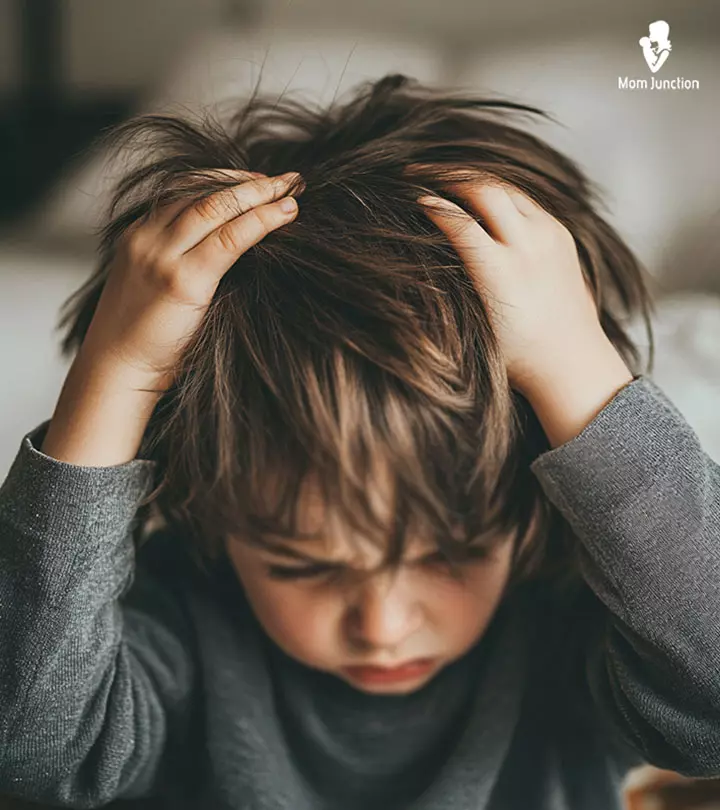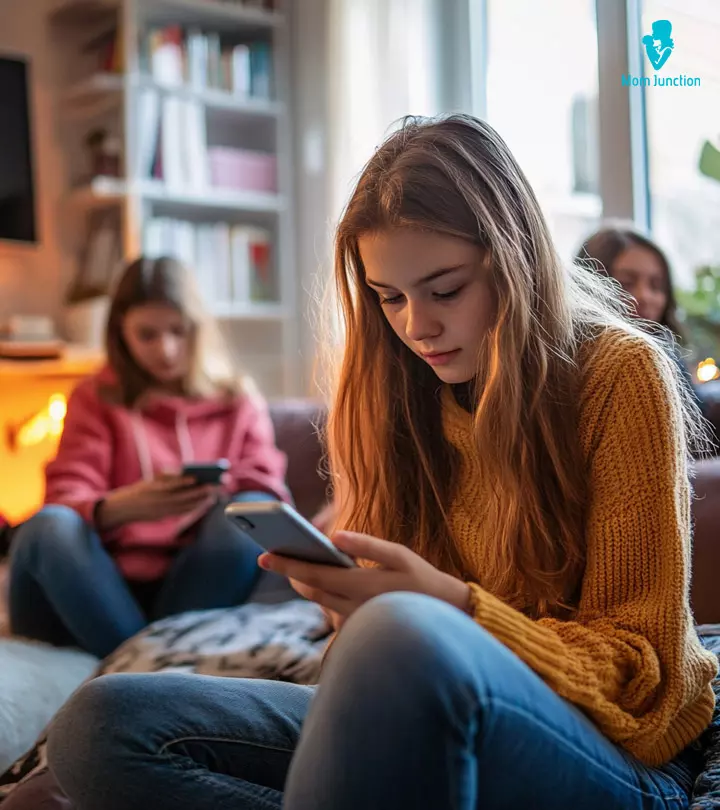
Image: Midjourney/ MomJunction Design Team
Parents may consider giving their teenagers mobile phones for security purposes. However, the possible misuse and other side effects of mobile phones on teenagers are not unknown. While it does serve the purpose of being aware of your child’s whereabouts, it is important to consider the adverse effects and health risks of mobile phones on teens. According to a survey conducted by the Pew Research Center, about 785 of all teens between ages 12 and 17 have mobile phones (1). It is a common sight these days to see a group of teens standing together but having no conversation and being involved in themselves. Teenagers use their mobile phones to call their parents and do other good and bad things. About one in four teenagers have access to the internet, far more than adults. Scroll through the post to know whether or not cell phones are good for teens, the negative impacts of cell phones, and tips on safe usage of mobile phones.

Key Pointers
- An observable association exists between the manifestation of teen tendinitis and excessive use of mobiles.
- The prolonged use of their mobiles can expose teenagers to elevated levels of stress, anxiety, and depression.
- Keeping the cell phone nearby while sleeping leads to sleep interruptions and increased tiredness among teenagers.
- There is a statistically significant association between excessive use of mobiles and increased cancer risk.
- Teenagers are exposed to cyberbullying, which has psychological repercussions like sadness, frequent headaches, anxiety, depression, and loss of interest.
Effects Of Mobile Phones On Teenagers
There is no doubt that a mobile phone is a handy tool. It eases communication with colleagues, friends, and relatives. But every technology that provides such benefits comes with a set of negative impacts. The impact of mobile phones on youth and society is immense. It is this area that requires attention when you are giving your teen a cell phone. Here’s how cell phones affect teenagers.
1.Teen tendonitis (TTT)
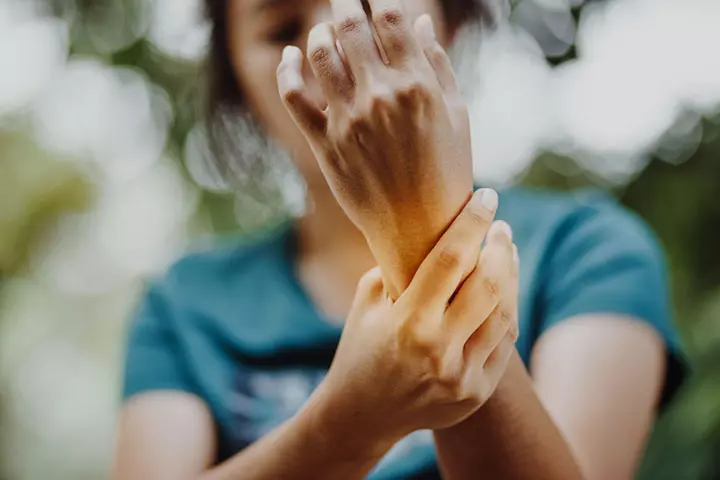
Excess messaging can lead to Teen Tendonitis (TTT). Besides the common signs of neck pain and posture problems, it also causes pain in the hands and back. According to a five-year cohort study, excessive cell phone usage is known to result in musculoskeletal disorders such as tendonitis and first carpometacarpal arthritis in the forearm and thumb (2).
2. Stress
Having a cell phone will tempt your teen to spend all day talking or texting instead of doing productive things. Studies have proven that teens who spend too much of their time with their cell phones are more prone to stress, anxiety, and depression. Research has also found that excessive use of smartphones may result in an increased risk of mental health problems (3).
3. Sleep loss
Most teens keep their cell phones nearby while sleeping to respond to texts and calls and remain reachable around the clock. This may lead to sleep disturbances and interruptions. Studies have found that teen social media addiction and usage of cell phones after lights out experienced increased tiredness. Also, college students who use cell phones after the onset of sleep are reported to be awake an extra 46 minutes per week (4). Moreover, the blue light emitted by the phone screens is believed to lower the levels of melatonin, thus interrupting the sleep cycle.
4. Accidents
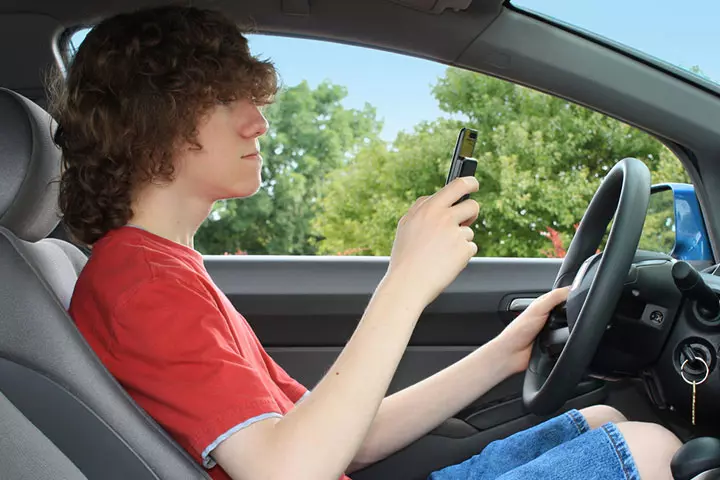
Teens tend to attend calls and text while driving, which is proven to be dangerous. According to the Centres for Disease Control and Prevention (CDC), teens are more likely to be distracted than drivers of any other age (5). So, using a cell phone while driving should be a strict no.
5. Anxiety
Relying on texting as a primary mode of communication can increase anxiety in teens. Texting is instantly gratifying, but it also produces anxiety. The instant reply by a friend can bring joy and elation. But in case of delayed response or no response, this same pleasure can turn into disappointment. Also, cell phone addiction can turn into an obsession to check messages and reply immediately and lead to social isolation and a poor academic performance. It may also increase anxiety by creating an illusion that they had received a message even when there was no message, making them frequently check their phones (3).
A Pew Research Centre survey involving teens aged 13 and 17 revealed that 44% of teenagers check their phones as soon as they are awake, and about 56% of the teens link the absence of their mobile phone with loneliness, being upset, or feeling anxious. Additionally, girls were found to be more likely to feel lonely or anxious without their cell phones.
According to Tom Kersting, a licensed psychotherapist and the author of “Disconnected: How to protect your kids from the harmful effects of device dependency”, “Teens are addicted to phones because the content from social media is designed that way. Developers create powerful algorithms that intentionally target the pleasure-seeking part of the brain that produces dopamine. This part of the brain is tied to every addiction. Teens are essentially chasing dopamine 24 hours a day and don’t even realize it.”
6. Risk of cancer
Although there’s no clear evidence of the relationship between cell phone use and cancer, there are some statistically significant associations in some people. Data collected from five European countries have shown an increased risk of acoustic neuroma in those who have used a cell phone for ten or more years. However, at the same time, the radiation from cell phones is believed to be too low to cause any damage to the DNA and may only result in heating of the body area in contact with the cell phone (6).
Although there is no clear research supporting the risk of cancer and cell phone usage, it is said to have a broad range of health effects.
7. Cyberbullying

According to a study conducted on 13–18-year-olds by Cox Communications, 15% of children had been cyberbullied online, 10% had been cyberbullied by cell phone, and 5% had cyberbullied another person through a cell phone.
According to a survey, cyberbullying makes teenagers sad and unwilling to attend school. This study has also found that children who are cyberbullied have a higher risk of psychosomatic problems, such as frequent headaches, problems falling asleep, a higher rate of anxiety, and depression(7).
Cyberbullying is one of the most adverse effects of social media on children and teens. It is much more difficult to identify than physical bullying as it tends to be more invisible. Also, the perpetrators can hide behind the anonymity offered by the internet.
 Experts say
Experts say8. False prestige
The latest developments in cell phones have made it easy for teenagers to access any information. Most of the things projected on social media and the Internet may not be accurate, but those who are naive (at their age) might take them seriously which may lead to negative influences of media on teenagers. This might cause them to live in a fantasy world and develop false prestige. Some may also resort to crimes to fulfill their fantasies.
Boone Christianson, a licensed marriage and family therapist in Provo, Utah, and author of the book, 101 Therapy Talks, suggests, “We actually don’t need a phone to survive. When you cut off constant stimulus, you discover where your emotions come from, and then can deal with them. Once you’ve worked through them effectively, you don’t depend on your phone for a sense of security anymore.”
9. Obesity
Constant usage of cell phones may also cause obesity in teenagers. According to a study conducted by Harvard T.H Chan School of Public Health, teens who spend more hours a day on cell phones are more likely to become obese. The study further says that teens who spend more than five hours a day in front of screens are 43% more likely to get less sleep or exercise, resulting in obesity (9).
10. Vision problems

Increased use of cell phones is said to cause vision problems in teenagers. As per a study conducted on 30 medical students, 83% of them were found to have cell phone vision syndrome. The symptoms of eye strain may include stress, redness, burning sensation, blurred vision, and dry eyes (10).
Excessive usage of cell phones surpasses their usefulness and creates new problems in teenagers. While you may not stop your teenager from using a cell phone, it is possible to limit the usage by establishing some ground rules.
The percentage of children and teens of various ethnicities (aged 3 to 18) who had internet access solely via a smartphone is illustrated in the graph below. The data by The National Center for Education Statistics (NCES), 2019, suggests the percentage of Asians relying on a smartphone for home internet was relatively lower when compared to individuals of other ethnicities (11).

Percentage of 3 to 18yo who had home internet access only through a smartphone
Source: The National Center for Education Statistics (NCES)Before giving a cell phone to your teenager, make sure they are aware of the points below.
 Quick fact
Quick factSigns Of Mobile Phone Addiction In Teenagers
It’s important to recognize mobile phone addiction to manage its use effectively. While it’s not officially a mental disorder, excessive smartphone use can show signs similar to other addictions. Here are some signs to look out for (13).
- Constantly checking the phone, even when it’s not needed.
- Feeling anxious or upset when separated from the phone.
- Ignoring social interactions, physical activities, or schoolwork in favor of screen time.
- Losing sleep because of late-night phone use.
- Experiencing mood changes related to phone use.
- Struggling to cut back on phone use despite trying.
Parents and guardians should watch out for these signs to help support their teenagers. If you notice several of these behaviors regularly, it might be time to consider intervention or professional help.
Tips On Safe Usage Of Cell Phones For Teenagers
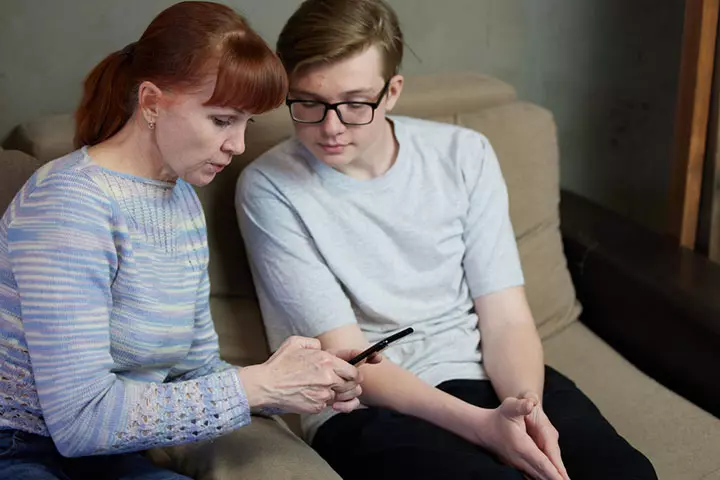
Cell phones are not going anywhere, at least not anytime soon. So, you need to teach your teens about mobile phone safety and how to use it responsibly. They also need to have agreed boundaries for mobile phone usage. Here are some ways to avoid the adverse effects of cellphones on teenagers:
- Negotiate with your teen on what should be the acceptable amount of time and money spent on cell phones.
- Tell them to curb their impulse of replying to texts instantly.
- Ask them to turn off their cell phone while driving.
- Ask them to turn off their cellphone before going off to sleep to maintain a regular sleep schedule.
- Teach your teen that short to moderate conversations on cell phones might help in decreasing the ill effects to some extent. Encourage them to limit conversations to not more than 20 minutes a day.
- Encourage installation of apps, which track daily phone use. This enables the user to keep a track of actual phone usage per day.
- Opt for a monthly plan that gives a structure for how many call minutes and text messages are available. If you are paying the bill, you can also have access to the mobile phone records, which will help you track how often your teen calls and sends messages and to which numbers.
- Ensure you set a good example by limiting your cell phone usage, as children tend to imitate or learn things more from parents.
- Establish a rule that the usage of cell phones is restricted at least one hour before sleep.
- Also, make sure your teenager keeps their cell phone away during meals or family gatherings.
Tim Dahi, a parent and author, briefs how he established a tech-free family environment with his teenagers during mealtime, “I have set some technology boundaries like device-free meal times which they (his children), of course, resisted, but the tradition gradually took hold (i).”
- Ensure your children spend some time daily in physical activities such as running, playing, or walking. Encourage them to leave their cell phone behind while doing such activities.
 Quick tip
Quick tipAlthough it is great to be a part of the growing technological world, don’t let the side effects of mobile phones on teenagers ruin their future. Do not let technology take away the happiness of playing outside and spending time with family. Cell phones can be helpful when used smartly. If not, it will have irreversible effects on relationships, studies, friendships, and family bonding. Talk to other parents and look for information online to know at what age should kids get a phone. Ensure to monitor phone time strictly if you plan on letting your teen have their mobile. Don’t make it easily accessible as they may end up wasting all day in front of the screen.
Infographic: Know If Your Teen Is Using Their Phone Responsibly
Cell phone addiction among teenagers is a growing problem and a concern for most parents. But it need not always be a problem if they are using it responsibly and in a healthy way. So how do you differentiate between your teen’s careless and responsible use of mobile phones? The questions mentioned in the infographic can help you understand the signs of healthy phone use.
Some thing wrong with infographic shortcode. please verify shortcode syntax
Frequently Asked Questions
1. Why do teenagers like their phones?
Teenagers might find themselves addicted to mobile phones to pass the time. Some teenagers might also like their phones as they pique their curiosity by providing a platform to learn and discover new things. There are many exciting gaming and social media apps, providing them with infinite possibilities to keep them occupied.
2. What are the signs of cellphone addiction in teens?
The signs and degree of cell phone addiction might vary with each teen. The common signs include frequently checking the phone, quick responses to incoming messages, a constant presence on social media, using headphones frequently, and disrupted sleep due to late-night phone usage.
3. What are the uses of smartphones for students?
Apart from the many disadvantages of a mobile phone, one cannot overlook the benefits. Regular phone applications such as calendars, notes, and emails, could help a child manage time and keep in touch with their professors. Many websites provide free access to textbooks and can be found online easily. With a cellphone, a student can attend a class from anywhere. If used properly, mobile phones could be a boon to students.
Illustration: Harmful Side Effects Of Mobile Phones On Teenagers
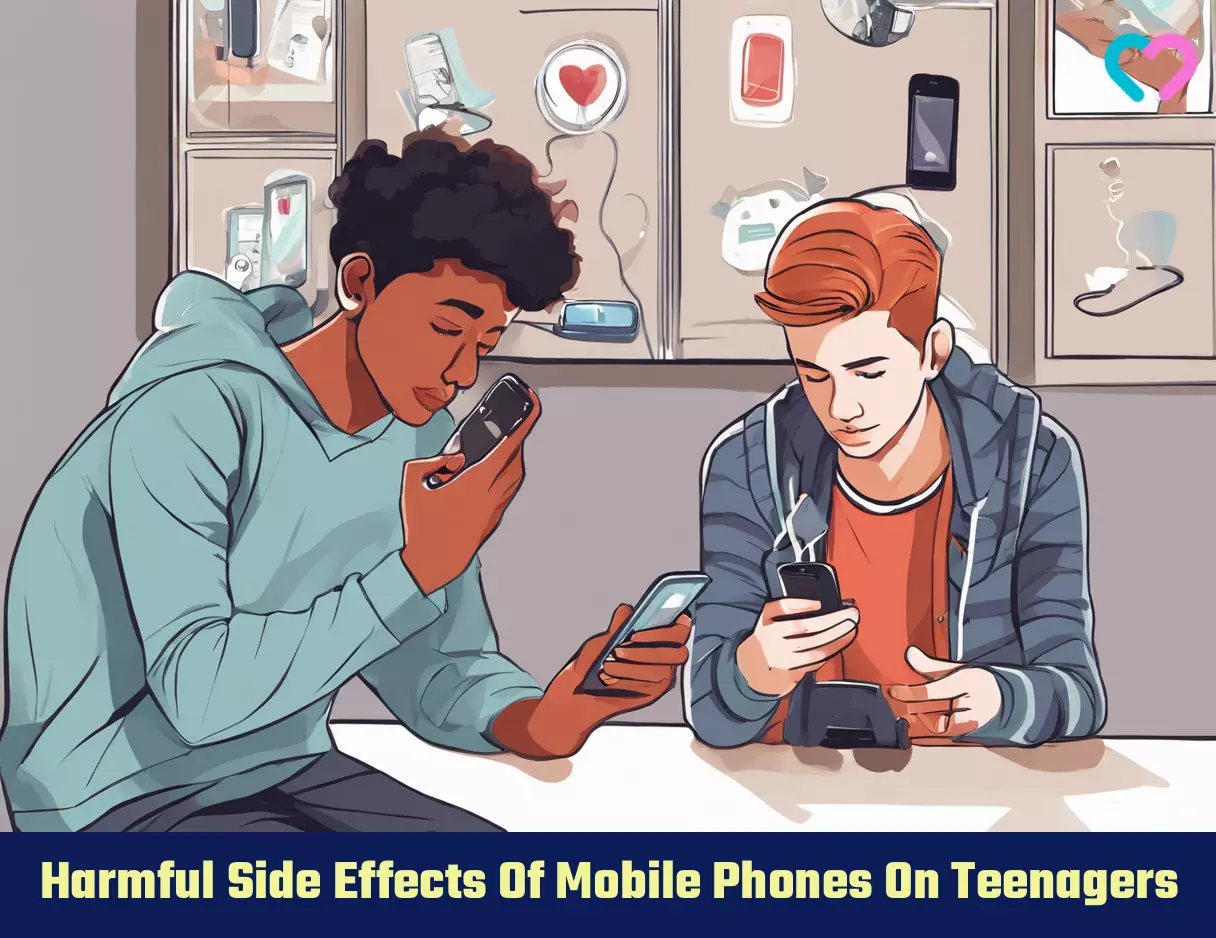
Image: Stable Diffusion/MomJunction Design Team
Examine how smartphones affect the growing brain in this informative video. Learn more about the effects and implications of smartphone usage on teenagers.
Personal Experience: Source
MomJunction articles include first-hand experiences to provide you with better insights through real-life narratives. Here are the sources of personal accounts referenced in this article.
i. My teenagers.https://medium.com/afwp/my-teenagers-65b4148a4be4
References
1. Amanda Lenhart, et al.; Teens and Mobile Phones; Pew Research Center (2010).
2. Ewa Gustafsson, et al.; Texting on mobile phones and musculoskeletal disorders in young adults: A five-year cohort study; Applied Ergonomics (2016).
3. Sehar Shoukat; Cell phone addiction and psychological and physiological health in adolescents; EXCLI Journal (2019).
4. Sue K. Adams, Jennifer F. Daly, and Desireé N. Williford; Adolescent Sleep and Cellular Phone Use: Recent Trends and Implications for Research; Health Service Insights (2013).
5. Distracted Driving; Centers for Disease Control and Prevention
6. Cell Phones and Cancer Risk; National Cancer Institute
7. Cyberbullying; U.S Department of Health and Human Science
8. Cyberbullying: What is it and how to stop it; UNICEF
9. Smartphone, tablet use linked with obesity in teens; Harvard T.H Chan School of Public Health
10. Aswitha Priya Sadagopan, et al.; Prevalence of Smartphone Users at Risk for Developing Cell Phone Vision Syndrome among College Students; Journal of Psychology & Psychotherapy (2017).
11. Children’s Internet Access at Home; The National Center for Education Statistics (NCES)
12. Screen Time and Children; The American Academy of Child and Adolescent Psychiatry
13. Smartphone Addiction; Santa Clara University
14. Computer vision syndrome; AMERICAN OPTOMETRIC ASSOCIATION
Community Experiences
Join the conversation and become a part of our nurturing community! Share your stories, experiences, and insights to connect with fellow parents.
Read full bio of Dr. Neha Bhave Salankar
- Thomas Kersting is a licensed psychotherapist and the author of “Disconnected: How to protect your kids from the harmful effects of device dependency”. He did his education at St. Thomas Aquinas College & Montclair State University. The founder and owner of Valley Family Counseling Center in Park Ridge, NJ, Tom is a regular on national television.
 Thomas Kersting is a licensed psychotherapist and the author of “Disconnected: How to protect your kids from the harmful effects of device dependency”. He did his education at St. Thomas Aquinas College & Montclair State University. The founder and owner of Valley Family Counseling Center in Park Ridge, NJ, Tom is a regular on national television.
Thomas Kersting is a licensed psychotherapist and the author of “Disconnected: How to protect your kids from the harmful effects of device dependency”. He did his education at St. Thomas Aquinas College & Montclair State University. The founder and owner of Valley Family Counseling Center in Park Ridge, NJ, Tom is a regular on national television. - Boone Christianson is a licensed marriage and family therapist from Provo, Utah, and the author of the book 101 Therapy Talks. He earned his master’s degree, Marriage and Family Therapy/Counseling in 2020 from Auburn University.
 Boone Christianson is a licensed marriage and family therapist from Provo, Utah, and the author of the book 101 Therapy Talks. He earned his master’s degree, Marriage and Family Therapy/Counseling in 2020 from Auburn University.
Boone Christianson is a licensed marriage and family therapist from Provo, Utah, and the author of the book 101 Therapy Talks. He earned his master’s degree, Marriage and Family Therapy/Counseling in 2020 from Auburn University.
Read full bio of Dr. Ritika Shah
Read full bio of Swati Patwal
Read full bio of Apoorva K


















